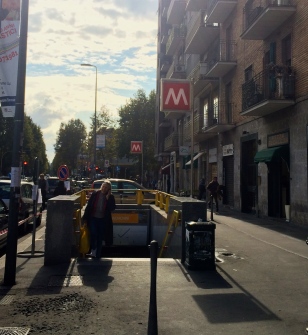Anch’io sono nata in Italia, sono cresciuta qui ma diciamo che ho avuto difficoltà a considerarmi Italiana per un bel po’. Questo era dovuto anche al fatto che fino alla maggiore età tecnicamente lo stato non mi considerava come tale, ma bensì un’extracomunitaria a tutti gli effetti. Per le poche persone che tuttora non sanno molto riguardo la legge di cittadinanza italiana, un/a bambino/a con genitori immigrati nato/a e cresciuto/a sul suolo Italiano deve aspettare di compiere 18 anni per acquisire la cittadinanza italiana. Dopodiché comunque ha solamente una finestra di un anno per fare domanda, cioè andare in Comune, prendere un appuntamento, presentarsi con la documentazione necessaria e solo dopo che quest’ultima sia approvata potrà fare il giuramento. Certo la può ottenere se uno dei genitori l’ha già ottenuta, ma il procedimento non è che sia proprio facile e sbrigativo.
Si arriva quindi a 18 anni a recitare queste parole: “Giuro di essere fedele alla Repubblica italiana, di osservarne lealmente la Costituzione e le leggi”. All’epoca non capivo la necessità di questo giuramento: non l’avevo mica fatto già per 18 anni? Perbacco, ero più italiana io di altri miei coetanei “italiani-italiani” che dispregiavano la musica italiana, si lamentano ogni 2×3 dell’Italia e idolatravano ciecamente tutto ciò che era americano, mentre io amavo anche Fantozzi, Renato Pozzetto, Cristina D’Avena e gli 883!
Insomma cresci in Italia, vai a scuola in Italia, studi tutto quello che c’è da sapere del Bel Paese, culturalmente vieni cresciuto come italiano/a e quindi ti senti al 100% come tale… però lo stato non ti riconosce come tale! E ti dici: maccheccazzo che assurdità è mai questa!!
Non essere tecnicamente italiani a livello burocratico aumenta il senso di ‘liminalità’ con cui noi figli d’immigrati cresciamo, se non di esclusione. La cosa ti pesa eccome, specie durante l’adolescenza. Per carità, il senso di esclusione lo proviamo tutti prima o poi nella vita, non c’è scampo, ma il mio e quello di molti altri figli d’immigrati è specifico ad un mancato senso di riconoscimento a livello governativo. Come un amore non corrisposto. C’è il rischio poi che questo sentimento possa trasformarsi in risentimento e manifestarsi in atti molto più gravi.
Il passaporto italiano lo vedi come una meta irraggiungibile, un privilegio.
Quando finalmente lo ricevi è come aver vinto la Champions.
Senza il passaporto italiano infatti non avrei potuto viaggiare in tanti dei paesi in cui sono stata in questi anni, ma soprattutto non avrei potuto intraprendere la carriera accademica a Londra, senza bisogno di visti/permessi e pagando ’solo’ la quota di £3200 come studentessa EU (invece che quella assai cospicua per gli studenti internazionali).
I problemi legati alla mia liminalità ci sono ancora e rimarranno sempre certo, ma quel libricino un senso d’inclusione maggiore me l’ha dato. Quindi perchè non risparmiare a molti altri ragazzi anni di fila all’Ufficio Immigrazione o in Questura, mancato senso di eguaglianza e facilitare il processo per la cittadinanza? Ecco…. Perché no, Senato? Perché si trova sempre un pretesto per rimandare la legge? Perché sui TG quando si parla dello Ius Soli Temperato si mostrano le immagini di barconi a Lampedusa, due ‘problematiche’ a se stanti che non c’entrano niente l’una con l’altra (partorire in Italia non comporterebbe ottenere la cittadinanza immediata e quant’altro)?
Io con questo inviterei i miei amici ‘italiani-italiani’ a informarsi su questo tema e a prendere una posizione, firmando la petizione in basso se si considera tutto ciò abbastanza assurdo. Anzi, vorrei invitare ogni singola persona che mi conosce a valutare la nostra amicizia, l’opinione che avete su di me. Mi avete mai visto come diversa? Il mio colore della pelle vi ha mai turbato? Salvo lo stupore iniziale, non siete riusciti a conciliare il fatto che parlassi un italiano quasi perfetto e avessi la pelle marrone? Vi ho dato modo di pensare che avrei fatto del male a voi e ai vostri cari? Che vi avrei derubato?
Se a queste domande avete risposto no, sappiate che ci sono molti altri bambini/ragazzi in Italia simili a me nella mia stessa situazione, che farebbero di tutto per essere riconosciuti come ‘Italiani’.
Quindi basta con la disinformazione ma soprattutto basta col silenzio!
Perché non è solamente una questione di civiltà ma anche di buon senso.

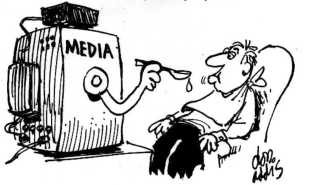 venor of the course taught how non-Western countries tend to remodel Western media programmes, TV series, films and other media products in general. They do this to accommodate their own specific media traditions, values and cultures: make it more appealing to their own cultures and values. We looked at how every media is owned by a few major corporations that tend to be mostly American or European. We saw how easy it is to create one sole voice that influences everyone everywhere. Not a huge surprise to most I guess, but for first year undergrads I suppose so.
venor of the course taught how non-Western countries tend to remodel Western media programmes, TV series, films and other media products in general. They do this to accommodate their own specific media traditions, values and cultures: make it more appealing to their own cultures and values. We looked at how every media is owned by a few major corporations that tend to be mostly American or European. We saw how easy it is to create one sole voice that influences everyone everywhere. Not a huge surprise to most I guess, but for first year undergrads I suppose so.
 ged the sheer unsubstantiated research they conducted (or didn’t, thereof) for ‘Aladdin’. When I showed the clip in class close to the end of term, it was received well by most, who were outraged but now made sense of the confusional mix of Muslim/Arabic/Indian/Middle Eastern symbolism present in ‘Aladdin’. But there were a few who remained unconvinced, who opposed my slight ‘bashing’ of their dear childhood film. One of them in particular was quite adamant to chaning her perception of ‘Aladdin’.
ged the sheer unsubstantiated research they conducted (or didn’t, thereof) for ‘Aladdin’. When I showed the clip in class close to the end of term, it was received well by most, who were outraged but now made sense of the confusional mix of Muslim/Arabic/Indian/Middle Eastern symbolism present in ‘Aladdin’. But there were a few who remained unconvinced, who opposed my slight ‘bashing’ of their dear childhood film. One of them in particular was quite adamant to chaning her perception of ‘Aladdin’.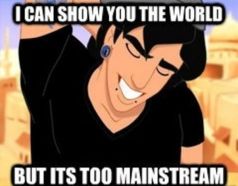

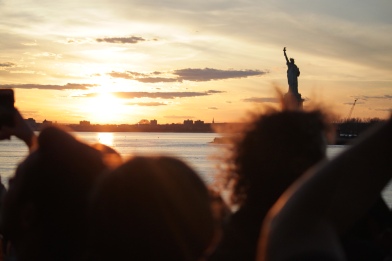 fuss was about.
fuss was about.
 phenomenon is becoming reality every day that passes by actually, Amazon being one of the most notorious examples. However, while walking in the streets of Ne York I wondered what the future holds for many people living in the cities around the world and what will happen to humankind in general. My prevision is that homelessness will inevitably increase without a basic income provided by governments. Funding wars or walls is complete non-sense when you’re faulty internally, when your own people are miserable and you’re not doing anything to alleviate the problem. It’s the clichè idea you hear most leftist groups talk about, but it’s freakin’ true!
phenomenon is becoming reality every day that passes by actually, Amazon being one of the most notorious examples. However, while walking in the streets of Ne York I wondered what the future holds for many people living in the cities around the world and what will happen to humankind in general. My prevision is that homelessness will inevitably increase without a basic income provided by governments. Funding wars or walls is complete non-sense when you’re faulty internally, when your own people are miserable and you’re not doing anything to alleviate the problem. It’s the clichè idea you hear most leftist groups talk about, but it’s freakin’ true!





 To be honest I don’t blame them: it is quite hard living with this constant sense of liminality, of always questioning your different life outlooks based on the various cultures you inhabit. Whom I blame are the people who, possibly without even caring for my own well-being, voice their opinions to my parents, feeling entitled to remind them what ‘our traditions’ are. I do get upset with my mom and dad for their weakness in standing up for me, I struggle with their indecisiveness in taking a firm stance on this. They fidget from one view to another by not telling others, as they do with me, that they’re proud of their daughter’s achievements in her studies and career, that they too don’t think of marriage as a priority and that they’d rather want an unmarried daughter rather than one who ended up hastily marrying the wrong person for her.
To be honest I don’t blame them: it is quite hard living with this constant sense of liminality, of always questioning your different life outlooks based on the various cultures you inhabit. Whom I blame are the people who, possibly without even caring for my own well-being, voice their opinions to my parents, feeling entitled to remind them what ‘our traditions’ are. I do get upset with my mom and dad for their weakness in standing up for me, I struggle with their indecisiveness in taking a firm stance on this. They fidget from one view to another by not telling others, as they do with me, that they’re proud of their daughter’s achievements in her studies and career, that they too don’t think of marriage as a priority and that they’d rather want an unmarried daughter rather than one who ended up hastily marrying the wrong person for her.
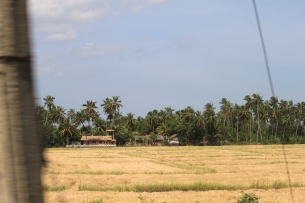 I had this type of revelation this summer in Sri Lanka, when in my room I found a book that I had taken with me 2 years earlier to Thailand: “A Fortune-Teller Told Me: Earthbound Travels in the Far-East” by Tiziano Terzani. Without going into much detail, Terzani was an acclaimed Italian journalist, author and correspondent in East-Asia to German and Italian newspapers. While he describes his “Earthbound Travels” in South-East Asia, he reflects on the changes that are happening in the region, the process of modernization that the continent is undertaking, which in his own opinion isn’t for the better.
I had this type of revelation this summer in Sri Lanka, when in my room I found a book that I had taken with me 2 years earlier to Thailand: “A Fortune-Teller Told Me: Earthbound Travels in the Far-East” by Tiziano Terzani. Without going into much detail, Terzani was an acclaimed Italian journalist, author and correspondent in East-Asia to German and Italian newspapers. While he describes his “Earthbound Travels” in South-East Asia, he reflects on the changes that are happening in the region, the process of modernization that the continent is undertaking, which in his own opinion isn’t for the better. Ironically in perfect timing, a week later reading these lines I had the opportunity to take the infamous A2 highway in Sri Lanka as we decided to explore the Southern part of the country, which I had never visited before. Needless to say I was quite excited to see what all the fuss was about regarding this new shiny infrastructure that connected the southern cities to the capital, Colombo.
Ironically in perfect timing, a week later reading these lines I had the opportunity to take the infamous A2 highway in Sri Lanka as we decided to explore the Southern part of the country, which I had never visited before. Needless to say I was quite excited to see what all the fuss was about regarding this new shiny infrastructure that connected the southern cities to the capital, Colombo. the UK, surrounded by a scenery and flora that is specific to Europe, was now replaced by palms, thick jungles, elephants, eagles and other wonderful creatures specific to the Sri Lankan island.
the UK, surrounded by a scenery and flora that is specific to Europe, was now replaced by palms, thick jungles, elephants, eagles and other wonderful creatures specific to the Sri Lankan island.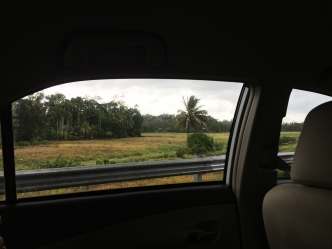 t, I am very well aware of the importance of infrastructure, I know how crucial it is for society. I acknowledge my privileged position, as well: I don’t have to go to work in Colombo, I am not a commuter who might be extremely thankful for this highway that lets him/her come back home earlier to their family, I indeed don’t have a family to feed, I don’t live in a country that constantly has to confront itself with the rest of the modernizing world. Now that I think about it, I too might have that ‘tourist gaze’ that foreigners have when they go to Sri Lanka and all they might see is the beauty of the ‘exotic’.
t, I am very well aware of the importance of infrastructure, I know how crucial it is for society. I acknowledge my privileged position, as well: I don’t have to go to work in Colombo, I am not a commuter who might be extremely thankful for this highway that lets him/her come back home earlier to their family, I indeed don’t have a family to feed, I don’t live in a country that constantly has to confront itself with the rest of the modernizing world. Now that I think about it, I too might have that ‘tourist gaze’ that foreigners have when they go to Sri Lanka and all they might see is the beauty of the ‘exotic’.
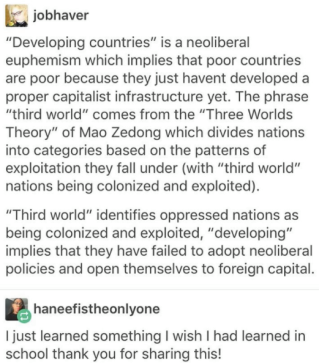
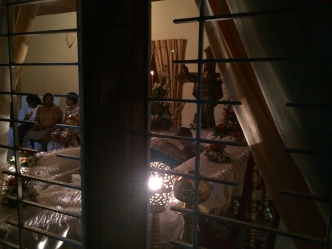 Grief is processed ‘in silence’, privately, with black sunglasses to cover your eyes and mask your pain. Hence I saw in Sri Lanka was simply and utterly… mental, or at least I thought so while I was living it. This was the occasion where I really understood how little I had experienced my Sri Lankan cultural identity. Everything seemed so strange, quite eccentric in some ways, everything brought to the exaggeration rendering all of what was happening more overwhelming. The wailing was what struck me the most, or actually screaming describes it better. But what I figured out in retrospect was that it was all part of the ritual.
Grief is processed ‘in silence’, privately, with black sunglasses to cover your eyes and mask your pain. Hence I saw in Sri Lanka was simply and utterly… mental, or at least I thought so while I was living it. This was the occasion where I really understood how little I had experienced my Sri Lankan cultural identity. Everything seemed so strange, quite eccentric in some ways, everything brought to the exaggeration rendering all of what was happening more overwhelming. The wailing was what struck me the most, or actually screaming describes it better. But what I figured out in retrospect was that it was all part of the ritual.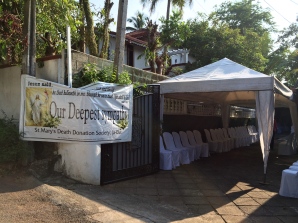 -On the day of the funeral, people gathered at our house before the town priest came and the ‘body’ was carried to church. Prayers were recited as usual but it was what followed that shook me to the core. People were crying and wailing in the very anthropological ritualistic sense of the term. My mother and my aunt were crying like I had never seen before. People behind me were encouraging me to do the same. I just felt it was too overwhelming for me. I felt as I was being forced to cry and for that very fact, tears would not come out initially. It all seemed staged for me, like a performance (also due to the fact that a band was playing and accompanying us to the church).
-On the day of the funeral, people gathered at our house before the town priest came and the ‘body’ was carried to church. Prayers were recited as usual but it was what followed that shook me to the core. People were crying and wailing in the very anthropological ritualistic sense of the term. My mother and my aunt were crying like I had never seen before. People behind me were encouraging me to do the same. I just felt it was too overwhelming for me. I felt as I was being forced to cry and for that very fact, tears would not come out initially. It all seemed staged for me, like a performance (also due to the fact that a band was playing and accompanying us to the church).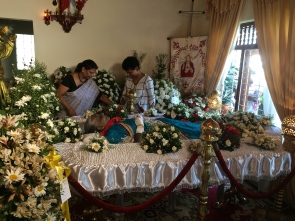 this ritual, but I’ll spare you that.
this ritual, but I’ll spare you that. I wonder now what I should consider ‘normal’. In a future event should I behave and grief as a Sri Lankan, be ‘loud’ when dealing with sorrow, or should I remain composed and private in my mourning as I’ve seen in Milan and London? Where does my identity lie in mourning?
I wonder now what I should consider ‘normal’. In a future event should I behave and grief as a Sri Lankan, be ‘loud’ when dealing with sorrow, or should I remain composed and private in my mourning as I’ve seen in Milan and London? Where does my identity lie in mourning? e never felt fully at ease in Milan. Also, to be honest, there’s always something that reminds me of my ‘Otherness’ whenever I come back. It might be certain news on the TV, or even a comment heard while in the supermarket or a joke.
e never felt fully at ease in Milan. Also, to be honest, there’s always something that reminds me of my ‘Otherness’ whenever I come back. It might be certain news on the TV, or even a comment heard while in the supermarket or a joke.